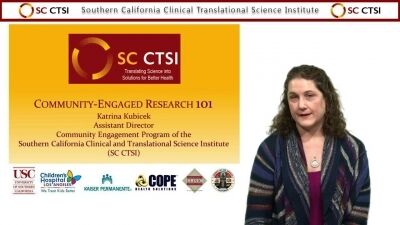In this video, an SC CTSI specialist introduces the basic characteristics of community-engaged research and the rationale for this research approach, including the development of health solutions among groups that have historically been underrepresented in medical study. Clinical and translational investigators learn the ways in which community-engaged research differs from traditional research, notably how it transforms the role of community stakeholders from research subjects to research participants, who help shape or even drive research questions that address urgent health needs. The lecturer discusses the different types of community-based research, including community-based participatory research (CBPR). Also covered are techniques for engaging local community groups and stakeholders in all aspects of the research, from funding to data collection, to ensure a successful community-engaged research project.
Community-Engaged Research 101
Approaches and benefits to community-engaged research, including the differences from traditional research and its unique benefits for clinical and translational investigators.
Course Syllabus/Topics
- Definition of Community-Engaged Research and Distinctions from Traditional Research
- Incorporating Community-Engagement into Traditional Research Approaches
- Benefits of Community-Engaged Research Approaches
- Rationale for Community-Engaged Research
- Building Trust with Community Stakeholders and Participants
- Reporting Progress and Communication with the Community
Resources
- Israel, B. A., Eng, A., Schulz, A. J., Parker, E. A., & Satcher, D. (2005). Methods in community-based participatory research for health. San Francisco: Jossey-Bass.
- Minkler, M. (2008). Community-based participatory research for health: From process to outcomes. San Francisco: Jossey-Bass.
- Centers for Disease Control and Prevention, (2011). Principles of community-engagement.
FAQ
No. The NIH National Research Service Awards (F30, F31, F32) is granted to predoctoral and postdoctoral MD/PhD students, and predoctoral and postdoctoral fellows. In addition to K Scholars, this course is open to faculty, clinicians, community health workers, fellows, post-docs, TL1 and F trainees, as well as medical, OT/PT, pharmacy and other students who intend to conduct clinical and translational research.
